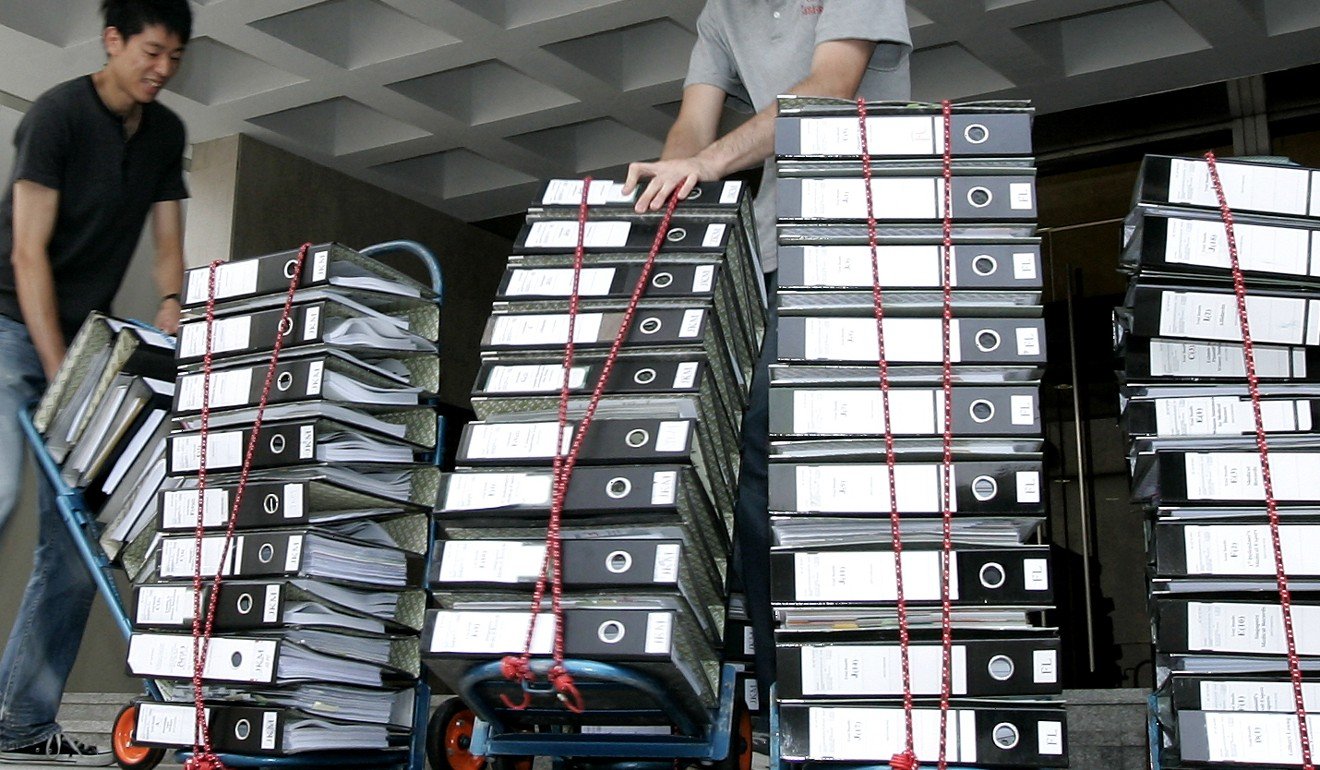
Hong Kong courts set to start going paperless this year, after a long period of deliberation
- The transition will be rolled out initially at District Court and Magistrates’ Court levels
- Some say the move is long overdue and that Hong Kong lags far behind Singapore, whose courts have allowed electronic filing since 2000
Hong Kong’s judiciary will start moving towards being paperless at District Court and Magistrates’ Court levels as early as this year, following seven years of discussions.
The long-awaited transition, which was first floated in consultation with the legal profession in 2012, could boost Hong Kong courts’ efficiency and competitiveness against regional competitor Singapore, which has had paperless courts since 2000.
But the legal profession said the wait has been too long, and urged the judiciary to give a clear indication on when the “e-courts” would be in full operation at other levels.
Meanwhile, lawyers have also asked for greater leeway to accept late submissions, which is sometimes tolerated at the court registry.
Currently, Hong Kong courts require litigants and lawyers to submit judicial applications and case materials in the form of printed copies. In practice, per legal sources, litigation lawyers are accustomed to exchanging some papers with adversaries. Some judges have also asked for electronic copies for easy reference.

The city however has lagged behind in formally recognising the filing of legal papers by electronic means, which could reduce printing expenses and increase the efficiency of proceedings. Britain started to roll out electronic filing in some commercial tribunals in 2015. The US federal court has introduced an electronic filing system, and the Supreme Court has made electronic filing mandatory since 2017 to save costs for the public and litigants.
Under a previous pilot scheme, Hong Kong lawyers could choose to file an additional digital copy, but the physical copy remained a procedural requirement.
In a paper to be discussed by the Legislative Council’s panel on administration of justice and legal services on Monday, the Judiciary said it planned to provide an “electronic option” for the filing of court documents. It would start with criminal and civil cases in the District Court, as well relatively simple cases involving summons in the Magistrates’ Court.
Under the proposal, litigants and lawyers would need to be registered on an electronic case management system. Local legislation would also be amended to set out “e-court” procedures, where the Chief Justice could issue new administrative guidelines in future.
Although the use of electronic copies is on the rise, the Judiciary said it was important to maintain parity between the two types of submission for as long as possible.
“This is to ensure the administration of justice will not be affected because of the introduction of a possible additional mode of handling documents,” it said in the paper.

Courts would accept electronic filing only until 5.30pm each day. Late submissions would be handled the next working day.
The judiciary said it would also recognise electronic signatures for registered users, while the court would start to issue digital seals to vouch for the validity of documents.
The legal community has generally welcomed the transition. The Law Society, the professional body for solicitors, noted that Singapore, the Australian state of New South Wales, and Britain have already implemented electronic filing systems.
“Singapore began the introduction of their electronic filing system as early as in 1997,” the society wrote. “To remain competitive … Hong Kong should aim to roll out its Information Technology Strategy Plan as soon as possible.”
While the new measure is expected to save time, the transition arrangements, particularly for time-sensitive cases, has been called into question, because untimely submissions could bring down an entire case.
The Law Society said criminal courts generally would not reject later filings of submissions.
“In our view, the rules on time limits and the proposed arrangement of electronic filing should not usurp the function of the criminal courts in receiving and admitting the above documents,” the society said.
“In other words, the flexibility and the discretion the criminal courts have to receive and admit late filing should not be disturbed by the e-legislation.”

